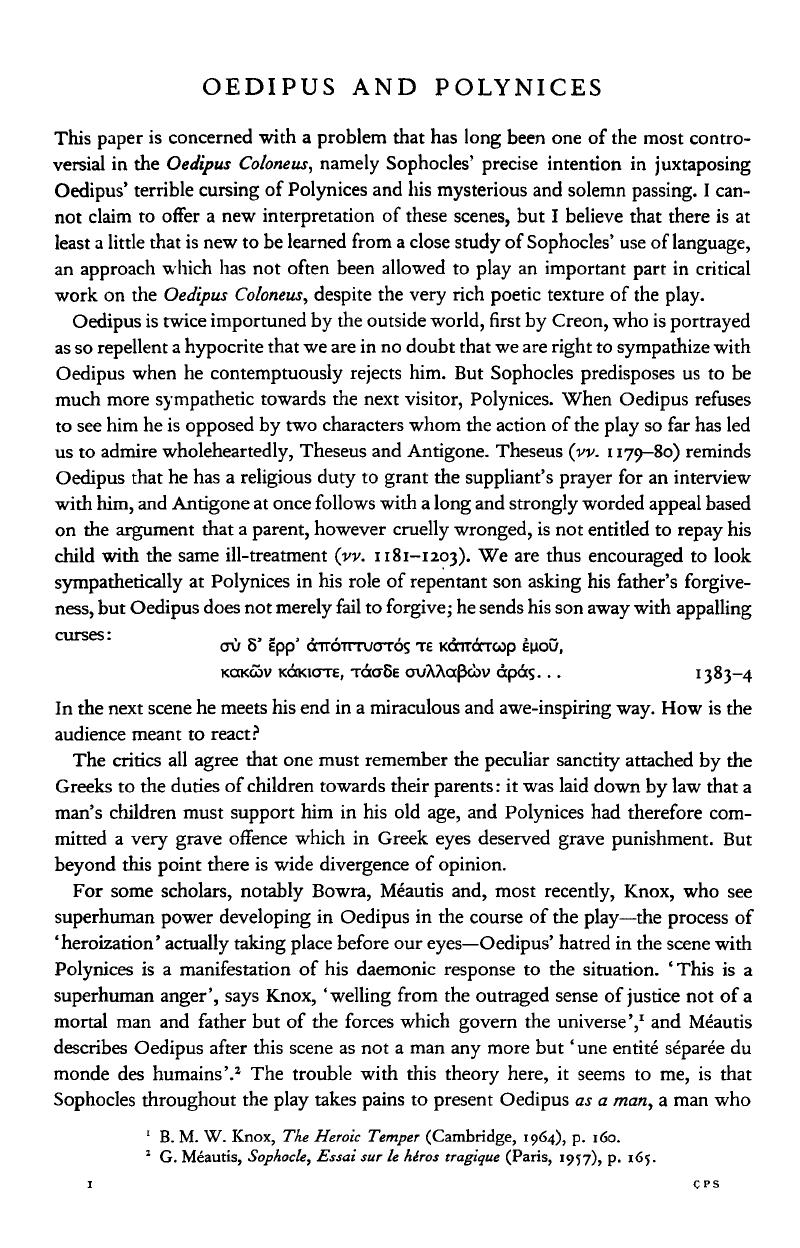Published online by Cambridge University Press: 25 March 2019

Page 1 note 1 B. M. W. Knox, The Heroic Temper (Cambridge, 1964), p. 160.
Page 1 note 2 G. Mautis, Sophocle, Essai sur le hros tragique (Paris, 1957), p. 165
Page 2 note 1 I. M. Linforth, Religion and Drama in Oedipus at Colonus', Univ. of Calif. Publ. in Class. Phil. 14/4 (1951), pp. 154-66.
Page 2 note 2 For a convenient summary see C. H. Whitman, Sophocles, A Study in Heroic Humanism (Harvard, 1951), p. 211.
Page 2 note 3 The Greek Tragic Poets (London, 1959), p. 167.
Page 3 note 1 A. J. Waldock, Sophocles the Dramatist (Cambridge, 1951), p. 226.
Page 3 note 2 On contrasts in this play cf. K. Reinhardt, Sophokles (Frankfurt, 1947), pp. 205-6, and U. von Wilamowitz in Tycho's book Die Dramatische Technik des Sophokles (Berlin, 1917), p. 355.
Page 3 note 3 A religious function of Greek tragedy', J.H.S.LXXIV (1954), P- 16 n. 7. Cf. M. Pohlenz, Die Griechische Tragdie, Erluterungen (Gttingen, 1954), p. 141.
Page 3 note 4 Cf. 362-4, 508-9, 1614.
Page 3 note 5 Lectures on Greek Poetry (London, 1926), p. 166.
Page 6 note 1 Ion 492.
Page 7 note 1 That the word ![]() and its cognates might be specially powerful in this context is suggested iby the wording of Solon's law about the treatment of parents by their children:
and its cognates might be specially powerful in this context is suggested iby the wording of Solon's law about the treatment of parents by their children: ![]() (Diogenes Laertius 1. 55). I owe the reference to Mr W. K. Lacey, who has also pointed out to me that Solon's laws were being investigated by the legal commission set up in 410, and were established by the restored democracy in 403/2. (On
(Diogenes Laertius 1. 55). I owe the reference to Mr W. K. Lacey, who has also pointed out to me that Solon's laws were being investigated by the legal commission set up in 410, and were established by the restored democracy in 403/2. (On ![]() as the vox propria in Greek for the care of parents by their children see Pohlenz, Erluterungen, p. 141.)
as the vox propria in Greek for the care of parents by their children see Pohlenz, Erluterungen, p. 141.)
Page 8 note 1 8, 75-6, 1640.
Page 9 note 1 It has often been pointed out that there is an inconsistency here: Polynices is now Said to have been actually king and therefore solely responsible for the offence against his father at the time when Oedipus was exiled, whereas earlier Oedipus has accused his sons only of not trying to prevent his exile (427), though later (599) he alters this to an accusation that they jointly drove him out. I agree with those critics who explain the change as motivated by Sophocles desire to use the confrontation between wronged father and erring son to the greatest possible dramatic effect, not as a sign of Oedipus own unfairness and misrepresentation of the facts.
Page 9 note 2 The implication is made very clearly at 1365: ![]()
Page 9 note 3 Cf. 704-5, 1085, 1536.
Page 10 note 1 Oedipus even calls Polynices his murderer (1361).